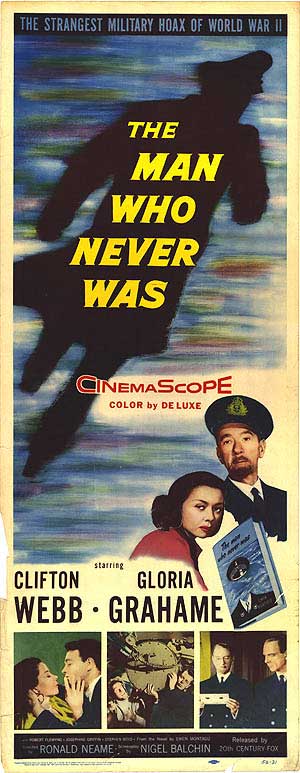ESL
This section contains simplified versions of entries on Midnight Oil meant for English Second Language Learners. Original versions in a more difficult English are found on the main journal for Midnight Oil.
The China Syndrome (1979) ESL
 “The China Syndrome” is a movie made over thirty years ago. It’s about a nuclear power plant in Southern California that nearly had a major meltdown. It was a very suspenseful movie. Even though it was a made-up story, it was very realistic. There was a real life nuclear accident at Three Mile Island in Pennsylvania just after the movie started to play in movie theatres in 1979. The coincidence of the release of the movie with the real accident was very scary. If there had been no coincidence, people probably would not have paid so much attention to this movie.
“The China Syndrome” is a movie made over thirty years ago. It’s about a nuclear power plant in Southern California that nearly had a major meltdown. It was a very suspenseful movie. Even though it was a made-up story, it was very realistic. There was a real life nuclear accident at Three Mile Island in Pennsylvania just after the movie started to play in movie theatres in 1979. The coincidence of the release of the movie with the real accident was very scary. If there had been no coincidence, people probably would not have paid so much attention to this movie.
In the movie, Jack Lemmon plays an engineer at the nuclear electrical power plant. This engineer discovers that there are some serious problems that could lead to a huge catastrophe. The film shows how Jack Lemmon’s character struggles to warn the public about the truth concerning the power plant. If this engineer had not attempted to report the problems to the public and to the proper government agency, there could have been an even worse disaster. The engineer is shot by the police at the end of the film and he dies. If he had not spoken up, he might have survived and continued to work at the power plant.
 If the engineer who worked inside the plant had not co-operated, the newspaper reporters who broke the story about the near meltdown at the nuclear power plant would never have succeeded in getting this important warning on the air. They didn’t know enough about the scientific or technological details to understand how significant the tremors were that they witnessed coincidentally in the power plant. They needed expert input to be able to interpret the events and to understand how dangerous things really were.
If the engineer who worked inside the plant had not co-operated, the newspaper reporters who broke the story about the near meltdown at the nuclear power plant would never have succeeded in getting this important warning on the air. They didn’t know enough about the scientific or technological details to understand how significant the tremors were that they witnessed coincidentally in the power plant. They needed expert input to be able to interpret the events and to understand how dangerous things really were.
If I were in the same situation as the engineer, I would have tried to warn people about the danger. Maybe I am not as brave as he was. I think that the engineer and the reporters did the right thing. Sometimes it is not easy to do the right thing. Sometimes it can cost you a lot.
Video trailer for "The China Syndrome" (1979)
It's a Wonderful Life (1946) ESL
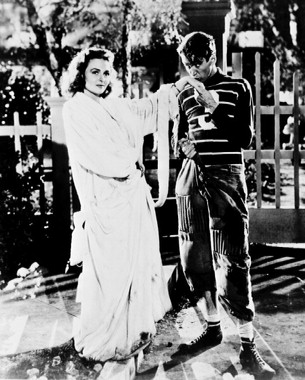 “It’s a Wonderful Life” is the kind of film everyone loves to see (and see again). Maybe it is a film that is often shown around Christmas, but it can be watched at any time of year. It seems like the more things change, the more a film like this stays the same. This film is like a kind of film-watchers’ comfort food. Our lives may be different today and society may be very different today. It is reassuring to come back and see this type of film. Perhaps some of us are not so sure anymore of why exactly we like this movie. Perhaps we have forgotten how the tradition of watching it got started. Perhaps if we think about it we will not be sure if the film is really all that good in the first place. We know that it’s a
“It’s a Wonderful Life” is the kind of film everyone loves to see (and see again). Maybe it is a film that is often shown around Christmas, but it can be watched at any time of year. It seems like the more things change, the more a film like this stays the same. This film is like a kind of film-watchers’ comfort food. Our lives may be different today and society may be very different today. It is reassuring to come back and see this type of film. Perhaps some of us are not so sure anymore of why exactly we like this movie. Perhaps we have forgotten how the tradition of watching it got started. Perhaps if we think about it we will not be sure if the film is really all that good in the first place. We know that it’s a 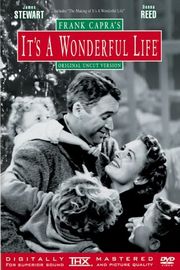 part of a well-worn tradition (like eating fruitcake and turkey giblet gravy at Christmas). For that reason, if for no other, we will probably see it again some time.
part of a well-worn tradition (like eating fruitcake and turkey giblet gravy at Christmas). For that reason, if for no other, we will probably see it again some time.
There’s just something terribly attractive about that everyman character, George Bailey (played by the actor Jimmy Stewart). It’s not that he’s all that good looking. He is not extremely clever or exceptionally charming or anything else. He’s just supposed to be an ordinary “nice guy”. In this big old mean old world, even nice guys can have some pretty big problems. At a certain point, George’s "wonderful" life falls apart and he finds 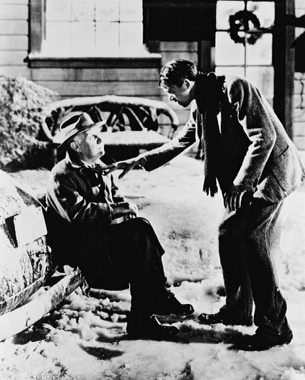 himself about to jump off a bridge to put an end to it all. George Bailey wonders out loud if his life has really been worth living. A guardian angel (played by actor Henry Travers) is immediately sent from heaven in order to put things right. If George had never been born, a lot of good things would never have happened. With the help of the unearthly messenger, George comes to realize that his life has had a tremendous impact, not only on his close family members, but on the whole community.
himself about to jump off a bridge to put an end to it all. George Bailey wonders out loud if his life has really been worth living. A guardian angel (played by actor Henry Travers) is immediately sent from heaven in order to put things right. If George had never been born, a lot of good things would never have happened. With the help of the unearthly messenger, George comes to realize that his life has had a tremendous impact, not only on his close family members, but on the whole community.
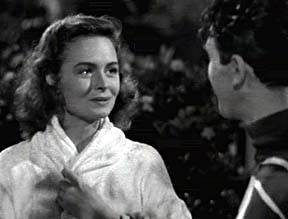 Wholesome is a good word to describe this film. It’s not a type of movie that you would see made today. Some people who might not like this film very much might use another word to describe it: maudlin. People like that might not really understand how things work in families and closely knit communities. They might not appreciate what exactly goes on around the family dinner table each Christmas at our house. There are just certain favourite dishes that my mother makes for every Christmas dinner (like the orange
Wholesome is a good word to describe this film. It’s not a type of movie that you would see made today. Some people who might not like this film very much might use another word to describe it: maudlin. People like that might not really understand how things work in families and closely knit communities. They might not appreciate what exactly goes on around the family dinner table each Christmas at our house. There are just certain favourite dishes that my mother makes for every Christmas dinner (like the orange 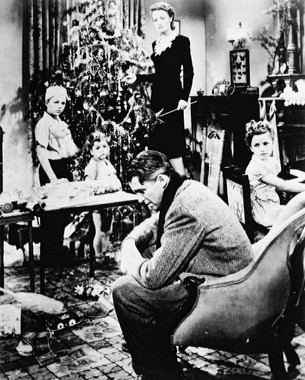 jellied salad or the buttered spicy squash). If you come as a guest for the dinner every year, you know that you are going to have to eat those dishes. It does no good to complain. You should just accept what is on the traditional menu offering and find something good to say about the salad (even if you don't like it that much). You’ll enjoy things a lot more if you do. And after all, what’s so bad about being good? Milk is wholesome too. It can be quite pleasant if you are used to it. And you would probably miss it if you could
jellied salad or the buttered spicy squash). If you come as a guest for the dinner every year, you know that you are going to have to eat those dishes. It does no good to complain. You should just accept what is on the traditional menu offering and find something good to say about the salad (even if you don't like it that much). You’ll enjoy things a lot more if you do. And after all, what’s so bad about being good? Milk is wholesome too. It can be quite pleasant if you are used to it. And you would probably miss it if you could  no longer have it. That’s kind of how I feel about “It’s a Wonderful Life”.
no longer have it. That’s kind of how I feel about “It’s a Wonderful Life”.
>>Not so Real Life: Sarah takes a chance on striking out in a new direction. Dealing with disappointments
>>More to see: Looking for more out of life?
<<Back to the orginal version of this post.
See the three minute summary of "It's a Wonderful Life" (1946). You can watch the whole movie in short segments here. Also see the scene where George lassos the moon (sweet-talks Mary to impress her).
Posted on Friday, February 11, 2011 at 02:08AM by ![]() Catherine Savard in 1940's films, Donna Reed, Frank Capra, Henry Travers, James Stewart, Lionel Barrymore, Steve Martin, Thomas Mitchell, comedy, fantasy, oldies, video trailer |
Catherine Savard in 1940's films, Donna Reed, Frank Capra, Henry Travers, James Stewart, Lionel Barrymore, Steve Martin, Thomas Mitchell, comedy, fantasy, oldies, video trailer | ![]() Post a Comment
Post a Comment
Places in the Heart (1984) ESL

« Back to the original version
In “Places in the Heart” (1984), writer/director Robert Benton tells us about a way of life as it once was in the deep South of the U.S. during the Great Depression of the 1930s. The main character of Edna Spalding is played by Sally Field. Edna suddenly becomes a widow. Her police officer husband is killed while on duty.
 Edna must now face life as a widow with two young children. Edna seems to represent many women of her generation. She is not prepared to deal with the harsh realities of life as a single parent. It is still very much a man’s world. She doesn’t even know how to write out a cheque. She certainly does not know how to run a farm and earn a living. Sally Field’s character,
Edna must now face life as a widow with two young children. Edna seems to represent many women of her generation. She is not prepared to deal with the harsh realities of life as a single parent. It is still very much a man’s world. She doesn’t even know how to write out a cheque. She certainly does not know how to run a farm and earn a living. Sally Field’s character, Edna, demonstrates courage, warmth and toughness even though she faces great problems. She attempts to keep her family together during a deep economic and personal crisis.
Edna, demonstrates courage, warmth and toughness even though she faces great problems. She attempts to keep her family together during a deep economic and personal crisis.
 Danny Glover plays the part of Moze. Moze is a migrant worker who ends up helping Edna to work the farm and bring in the cotton. Glover captures what it means to be a black man in this period of time. Moze searches not only for work to keep body and soul together, but for dignity to make life worth living. He finds both work and diginity for a short time with Mizz Spalding on a little farm just outside of the small town of Waxahachie, Texas.
Danny Glover plays the part of Moze. Moze is a migrant worker who ends up helping Edna to work the farm and bring in the cotton. Glover captures what it means to be a black man in this period of time. Moze searches not only for work to keep body and soul together, but for dignity to make life worth living. He finds both work and diginity for a short time with Mizz Spalding on a little farm just outside of the small town of Waxahachie, Texas.
 John Malkovich plays Mr. Will. Mr. Will is a complicated character whose injuries from the First Great War involve more than just the loss of his eyesight. He rents a room from Mizz Spalding and joins the household. Mr. Will temporarily finds a place to belong. He finds a group of people who need him almost as much as he needs to be needed.
John Malkovich plays Mr. Will. Mr. Will is a complicated character whose injuries from the First Great War involve more than just the loss of his eyesight. He rents a room from Mizz Spalding and joins the household. Mr. Will temporarily finds a place to belong. He finds a group of people who need him almost as much as he needs to be needed.
Robert Benton, the writer and director of this film, presents this movie as a semi-autobiographical work. There are two hymns that open and close the film. They form bookends for the movie. These scenes, accompanied by music, set up a  context for understanding the rest of the action of the film. In the middle of the film, there is some very memorable folk music with unusal irregular rhythms. The folk songs are about picking cotton. They are songs that perhaps the migrant workers would sing. (Cotton-Eyed Joe for example.)The music comes out of the real life experiences of the townspeople. The music is presented as something that’s a part of what the people here really live. It’s not just an ornament for the dramatic action.
context for understanding the rest of the action of the film. In the middle of the film, there is some very memorable folk music with unusal irregular rhythms. The folk songs are about picking cotton. They are songs that perhaps the migrant workers would sing. (Cotton-Eyed Joe for example.)The music comes out of the real life experiences of the townspeople. The music is presented as something that’s a part of what the people here really live. It’s not just an ornament for the dramatic action.
The final scene of the movie is the scene with the communion service in church. It raises particular issues. Everything else in the film has been very  realisic until the final scenes of the film. Why is it that unreality suddenly takes over? Edna’s dead husband and his killer suddenly appear sitting side by side in church. (The young black man who accidntally shot the police officer was later brutally murdered by a lynch mob of Ku Klux Klansmen.)Sitting there in the pew, the dead husband and the deceased young black man seem as normal as every other member of the community as the communion plate is passed. My thought is that by including this unusual unrealistic element,
realisic until the final scenes of the film. Why is it that unreality suddenly takes over? Edna’s dead husband and his killer suddenly appear sitting side by side in church. (The young black man who accidntally shot the police officer was later brutally murdered by a lynch mob of Ku Klux Klansmen.)Sitting there in the pew, the dead husband and the deceased young black man seem as normal as every other member of the community as the communion plate is passed. My thought is that by including this unusual unrealistic element,  Robert Benton wants to show us something about his main characters and the community they live in.
Robert Benton wants to show us something about his main characters and the community they live in.
“Places in the Heart” is a very memorable story about a place and a time that no longer exist. The magic in it is that Benton manages to help us to understand something of what it was like to live back there and back then, just as he lived it when he was a boy in his hometown.
Fahrenheit 451 (1966) ESL
 <<Back to the original version.
<<Back to the original version.
"Fahrenheit 451" (1966) , inspired by Ray Bradbury's science fiction novel of the same name, delivers a disturbing vision of a futuristic world where books are contraband to be burned by the state. For those of us who love books, this is a truly scary and undesirable future reality.
Werner Oskar stars 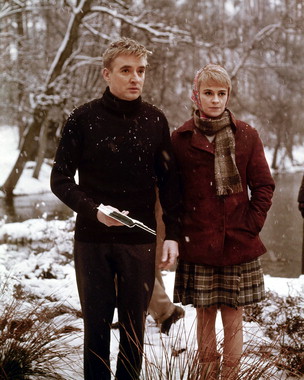 as the fireman who begins to question the purpose behind burning books in the oppressive police state. Julie Christie plays the double role of the witless wife of the fireman, Linda, and the open minded free spirit, Clarisse.The fireman eventually must choose between the two women and the two ways of looking at his profession
as the fireman who begins to question the purpose behind burning books in the oppressive police state. Julie Christie plays the double role of the witless wife of the fireman, Linda, and the open minded free spirit, Clarisse.The fireman eventually must choose between the two women and the two ways of looking at his profession
Check out Thom Ernst's blog for the scoop on his interview with the original author, Ray Bradbury, for the TVO Saturday Night at the Movies Interviews.
 View the TVO video web preview for "Fahrenheit 451" (includes snippets of the Bradbury interview)
View the TVO video web preview for "Fahrenheit 451" (includes snippets of the Bradbury interview)
See the video trailer for "Fahrenheit 451" (1966)
The Man Who Never Was (1956) ESL
"The Who Never Was” (1956) stars Clifton Webb. It is an interesting story about British military spying during WWII. The sotry is apparently based on actual events. Lieutenant Commander Ewen Montagu (Clifton Webb) finds himself with the challenging and somewhat nasty job of attracting the attention of the German High Command away from the Allies plan to invade the continent. The British decide to do this through planting misinformation on a dead body which the Germans find washed up on shore. Montagu and his team are determined in their efforts to serve the national interest.
In contrast, the cost of the war is also shown in terms of personal loss. This is depicted through seeing the grieving 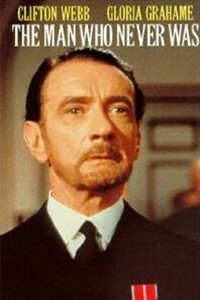 father of the dead man whose body is used for the trick. We also meet and the girlfriend (Gloria Greene) who is told by military officials that her beloved is dead. Though it is perhaps not the greatest spy thriller every made, I find this film to be interesting enough to watch again. The fictionalized account of actual spy stuff certainly makes this movie of historical interest for WWII film buffs.
father of the dead man whose body is used for the trick. We also meet and the girlfriend (Gloria Greene) who is told by military officials that her beloved is dead. Though it is perhaps not the greatest spy thriller every made, I find this film to be interesting enough to watch again. The fictionalized account of actual spy stuff certainly makes this movie of historical interest for WWII film buffs.
>>On to "Who's Directing Your Life?"
See the TVO SNAM preview for “The Man Who Never Was” (1956)
Catch the video trailer for the opening credits of “The Man Who Never Was” 1956. I believe that the dramatic reading in the opening is from a poem by H.G. Wells.




